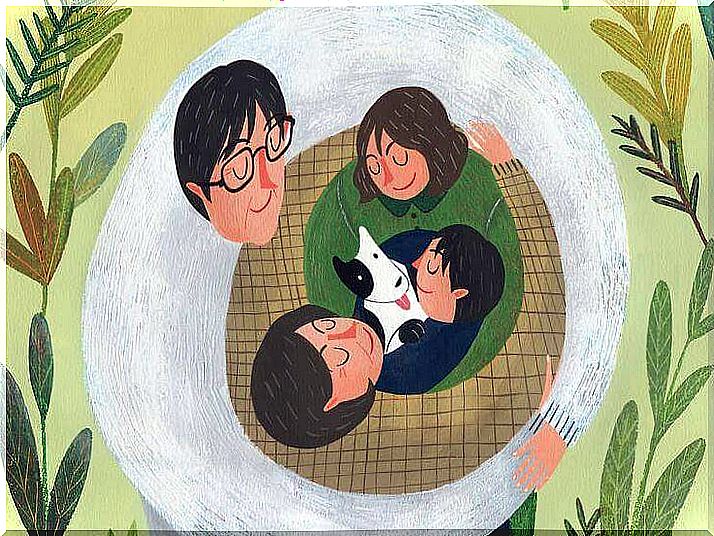Tips For Parents To Prevent Child Anxiety

Being a mother or father is not an easy task. Unfortunately, there is no ready-made manual that explains how we can raise happy children to become the mature adults of tomorrow, capable of realizing their dreams, whatever they may be.
One could say that one of the biggest problems parents face in raising children today is the anxiety of the youngest children of all. Nervous behavior, difficulty sleeping and almost endless fears… Why is all this?
Being a mother or father is an adventure from which we can learn something new every day. This adventure requires not only love but also courage and spiritual resources. Child anxiety is a challenge that we can try to address with certain parenting techniques.
If you notice signs of anxiety in your child, you should first remind yourself that your child’s behavior should not be corrected through punishment or negative words. This is not helpful, but on the contrary, it increases the anxiety felt by the child.
Also keep in mind that this is not a competition leading to the title of Best Mom or Dad in the World. You just need to be present. It’s about setting an example, supporting a child, and selfless love.
In today’s article, we want to show you how you can deal with a child’s anxiety.
Child Anxiety: Where Does It Come From?

It is very possible that you have heard it said more than once: “ Anxious children are a reflection of anxious parents. “ Sometimes, however, the causes of a child’s anxiety can be found somewhere else.
Anxiety is a reaction to a series of situations that are perceived as threatening. It can lead to fears as well as an inability to face everyday problems. Anxiety as a child may interfere with a child’s development on an emotional level.
We are sure that feelings like this are familiar to you. We all know what anxiety is – we have experienced it in our workplace, in our relationships… But why do children suffer from it?
- US-based psychiatry publication in the American Journal of Psychiatry ‘n According to a study conducted by children whose parents showed signs of anxiety, are more likely to develop similar problems.
- At some point in their childhood, the child may develop some form of fear. Fear of loneliness, fear of being rejected… In this case, any kind of separation, for example, simply leaving the child in school, causes stress to the child. We need to understand these fears and where they come from.
- There are experiences that very young children are unable to comprehend or process. For example , the loss of a family member, such as a grandparent, may give rise to absurd fears in the child that may develop into anxiety disorders.
A child’s individual universe of emotions is just as complex as it is sensitive. As parents, we do not have access to all of these dimensions. We can’t make our children’s lives as easy as we would like.
The most important thing is to be attentive. We should keep an eye on the child, give him intimacy and warmth, talk to him and listen to this. A child’s anxiety is the result of something we should understand and be able to deal with.
This is how you prevent and treat your child’s anxiety

Indeed, some emotional intelligence-based parenting methods can help us prevent and treat a child’s anxiety.
When it comes to educating a child, we need to be aware of ourselves and our own behavior. The child embraces, processes, and knows your words, gestures, reactions, and even your tone of voice. Act sensibly and consistently. One part of educating happy people is educating their emotions.
According to a study led by psychiatrist Golda Ginsburg, sometimes it is enough for one of the parents to be anxious about the child. As a result, the child may develop anxiety disorder, which is most likely in children aged 6-13 years.
According to the same psychiatrist, there is no single specific cause that would cause these problems. In reality, it is a combination of genes and many environmental factors.
If you or your spouse are suffering from anxiety disorder, it would be best to treat the problem and be aware of it so that parenting methods are not based on these patterns of behavior that may sometimes shine through us without even noticing it.
Let’s take a closer look at the techniques we can use to prevent and treat children’s anxiety:
1. Children should face their fears
Maybe you’re scared that something would happen to your child. Overprotection creates fears for our children, whether it is our intention or not. We must let them face their fears.
Fear of starting a new school, fear of being branded a bad player in a new football hobby, fear of asking questions in front of others, fear of not seeing you for a couple of days because you are going on a business trip…
We need to give our children the opportunity to develop their own techniques to deal with such situations. When they succeed in it and overcome their fears, they will be proud of themselves.
2. Use positive communication
Congratulate your child on everything he or she does, and most importantly, avoid punishing or criticizing your child for doing something wrong.
Punishment, raising your voice, and disincentive statements like “ whether you’re clumsy ” create anxiety for children in large numbers. Because of negative messages, a child may begin to avoid certain things, so it would be best to motivate, encourage, and support the child.

3. Understand what is important to your child
Sometimes we barely see and understand what things are important to our child because we don’t have enough time.
If it is important for your child to praise his or her drawing or good testimony, or if he or she tells you what his or her favorite animal is, pay attention to your child and always listen to this. If our children see that we don’t value them, they will become insecure, and insecurity will cause anxiety.
4. Talk about things that scare your child
Find out what scares your child, no matter how small. Is he afraid of the dark? Doesn’t he want to walk to school alone? Is he intimidated by failure in the experiment?
Talk openly to your child about this fear and do so with an understanding attitude. Finally, present a positive, encouraging solution to the problem and Remind the child that he or she is capable of anything and that he or she can always trust you and that you are his or her support.
Remind your child that the best warriors are not the ones who always win, but the ones who are able to overcome their fears and grow through those victories.
Photos: Jimmy Yoon, Claudia Tremblay









